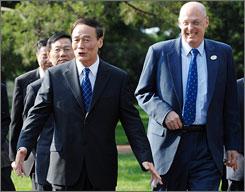| U.S., China close out 'highly successful' economic talks | |
|---|---|
| Jun 19, 2008 21:07 | |
 | source: http://www.usatoday.com/ By David J. Lynch, USA TODAY WASHINGTON — The United States and China concluded two days of high-level economic talks Wednesday agreeing to negotiate a new investment treaty and expand cooperation on energy projects. Treasury Secretary Henry Paulson hailed the modest outcome as "creating a foundation" for future gains. The head of the Chinese delegation, Vice Premier Wang Qishan, labeled the talks "highly successful." Briefing reporters at the talks' end, the officials said they agreed to begin negotiating a bilateral investment treaty like those the U.S. maintains with several other countries. Such treaties typically provide investors protection against having their assets seized, including the right to appeal disputes to an international arbitration panel, U.S. officials said. The two sides have been conducting preliminary discussions on such a treaty for 17 months, though no deal is expected before the November election. And Rep. Charles Rangel, D-N.Y., chairman of the House Ways and Means Committee, wrote Paulson citing "serious concerns" over a potential accord given Chinese trade practices that have swollen the U.S. trade deficit. U.S. investors covet such an agreement because they see it as a way to further open the Chinese market. |
| Jun 19, 2008 21:08 | |
 | The U.S. and China, the world's two largest oil importers, also signed a 10-year "cooperation framework" on energy and environmental issues. They agreed to set up task forces to study ways to make tangible progress in electricity, clean air and water, and conservation programs. But the Chinese offered no sign they intend to trim subsidies that encourage gasoline consumption for the country's legions of new drivers, as the U.S. urged. Paulson said the U.S. understood that subsidy cuts, which would raise pump prices, would be "difficult" for China to implement. The Strategic Economic Dialogue process is closely identified with Paulson, who persuaded President Bush to launch the twice-yearly talks in 2006. The Treasury secretary has argued that the dialogue, scheduled to resume in December, should continue under a new administration. He was asked by a Chinese reporter whether a Democratic president would be likely to do so. "If this SED produces tangible results that we wouldn't have otherwise achieved, then I'm an optimist that it will continue," he said. The atmosphere for the U.S.-China talks was notably different than during December's third round, held in Beijing. Tensions over China's currency policy have eased somewhat, as the yuan has risen by more than 20% the past two years. That makes it easier for U.S. manufacturers to compete with China-made products. Paulson said the U.S. "welcomed recent increased pace of appreciation of the (yuan) and urged China to continue to move to greater exchange-rate flexibility." |
| Jun 19, 2008 21:09 | |
 | That didn't satisfy administration critics such as Scott Paul of the Alliance for American Manufacturing, a small-business group critical of U.S. trade policies. He called for a "more robust approach from Washington." The U.S. economy also has weakened in recent months, complicating Paulson's efforts to promote accelerated market opening policies to the Chinese. "We were the teachers. Now they see the teachers aren't perfect. … They want to learn from our mistakes," he acknowledged. China Vice Premier Wang Qishan, left, and U.S. Treasury Secretary Henry Paulson as they wrapped up economic talks at the U.S. Naval Academy in Annapolis on Wednesday.  |
Post a Reply to: U.S., China close out 'highly successful' economic talks





 Copyright © 1998-2026 All rights reserved.
Copyright © 1998-2026 All rights reserved.